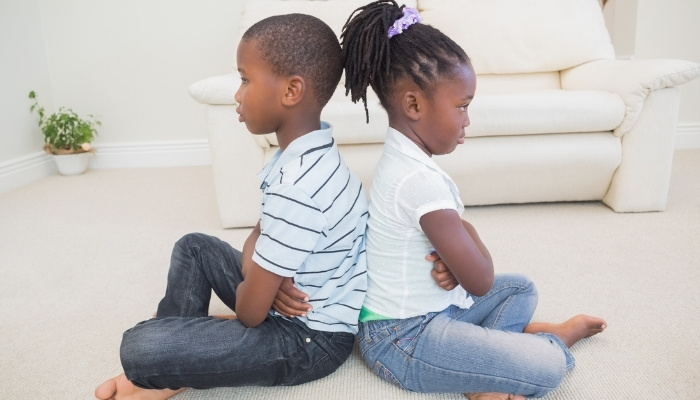Raising multiple children often results in numerous conflicts, worries, and inquiries about what constitutes normal behavior.
Opposing personalities, different interests, conflicting beliefs, or just being in close proximity to one another can cause tension in sibling relationships.
Is it normal for siblings not to get along? Yes, it’s fairly common for siblings to have conflict regardless of age or gender. Most conflicts in sibling relationships derive from the need for parental attention or being in different stages of development. In most cases, issues are quickly resolved.
Even though it’s normal, sibling conflict can be stressful and emotionally draining. Keep reading to learn more about assisting your children in maintaining a healthy relationship and managing your response to sibling rivalry.
Sibling Relationships – What To Expect
The way siblings behave toward one another depends strongly on the circumstances surrounding them.
There will be times when both children get along, times where one sibling is moody and the other is tolerating it, and times when neither sibling is capable of self-restraint.
Bickering
Bickering between siblings typically occurs over smaller issues and annoyances. This type of conflict doesn’t last long and often resolves itself without intervention.
Competing
Competition between siblings is normal and, in most cases, healthy. However, there are certain things your children shouldn’t feel the need to compete for.
- Parental attention and affection
- Understanding and acceptance
- Academic or athletic accomplishments
- Personal value or appearance
Jealousy
Jealousy can cause long-term issues in your children’s social development. Young children become jealous of parental attention and developmental needs.
They don’t understand why your attention is divided, why they must share you, or why their sibling requires your assistance.
In older children, jealousy usually stems from comparison. They observe how parents react to them, their accomplishments, and their interests in contrast to their siblings.
When something is perceived as unfair or unequal, it can cause feelings of insecurity and displacement.
Teasing
Teasing is often light-hearted on the part of the sibling doing it, but it usually still causes upset to the other sibling. As a result, how each sibling views this interaction will differ significantly.
Teasing tends to occur more between opposite-gender siblings due to different interests, stages of development, and values.
Occasional Fighting
There are many reasons that children fight, and some conflicts are more intense than others.
The tension between siblings increases when their social lives, developmental needs, or personalities clash. This happens most often in children of different genders or those with significant age gaps.
Wanting Time Apart
Sometimes siblings fight simply because they need space.
Conflict with those you live with is normal because each family member experiences not only their own emotions, challenges, and needs but those of everyone else as well.
This can be overwhelming and induce tension where none is necessary.
Issues Usually Resolved Quickly
Since your children know that they will have to be in one another’s presence following a fight, they tend to resolve issues quickly. Because of this, you’ll notice your children crying one moment and playing together the next.
This doesn’t mean that the underlying reason for the fight was unimportant to them but that maintaining a comfortable environment was their priority.
Underlying Love and Strong Bond
Conflict in childhood relationships typically stems from circumstances and perceptions rather than hatred or malicious intent. Siblings can love one another but grow agitated, annoyed, or hurt by one another’s actions or words.
Despite how it appears at times, siblings who fight often still have a close and meaningful relationship.

Unhealthy Sibling Relationships – When To Worry
While fighting between siblings is common, there are red flags that may indicate a larger underlying problem. Take note if any of the following apply to your children and consult their pediatrician. In extreme cases, seek help from a family therapist.
1. Constant Fighting
When there seems to be no end to the bickering, it can feel debilitating.
If your children are fighting at times and showing care at others, it’s indicative of a normal healthy sibling relationship. However, if very little love or care is demonstrated in ratio to how often they fight, it may be time to seek help.
2. No Respect for One Another
Intentionally disrespecting one another’s personal space, boundaries, belongings, values, or interests is a red flag. Many ill feelings between siblings come from a place of feeling misunderstood or undervalued.
If your children are constantly disregarding the other’s needs, encourage the siblings to take space and set clear, fair consequences for disrespect.
3. Deep Feelings of Resentment
Siblings can hold deep feelings of resentment toward one another if they don’t feel accepted, respected, or loved.
Though often misplaced, children perceive differently and hold onto those misperceptions longer. This can be detrimental to their adult relationship and current family dynamic.
If you notice your children growing resentful toward one another, be proactive in your approach. They may resist, but sitting down and talking through what they’re feeling is a great place to start communication.
4. Frequent or Intentional Physical Harm
If your children are consistently resorting to physical harm as a response to prodding or to provoke their sibling, then you should intervene. Offer non-violent alternatives, establish boundaries, and explain consequences for further actions.
5. Always Looking for Opportunities To Hurt the Other
One significant indication that it’s time to be concerned is if your children are actively seeking opportunities to physically, emotionally, or psychologically harm one another.
This emphasizes an innate desire to intentionally impact someone’s life negatively. This can, in turn, affect your child’s ability to hold healthy relationships in the future.
How To Help Siblings Get Along
You can’t prevent siblings from fighting with one another. However, there are ways that you can guide your kids in the right direction.
1. Don’t Get Involved
Try not to get involved in sibling arguments. Only act when there is a risk of mental, emotional, or physical harm.
When you must step in, don’t focus on placing blame or protecting the child that was wronged. Instead, aim to correct the negative behaviors and find solutions to the root issue.
2. Establish Boundaries
Remaining unbiased in your children’s conflicts is the goal. This means establishing ground rules that indicate certain consequences, no matter what action provoked them.
Rules to consider include no hurtful words out of anger, no physical violence, no slamming doors or breaking objects, etc. Doing so teaches kids that they are responsible for their responses, actions, and behaviors.
3. Reaffirm Them
Remind your children consistently that they are loved, cared for, respected, and understood. Self-confident kids are less likely to display aggressive and impulsive behaviors.
4. Be An Example
Children learn how to fight based on modeled behaviors from their parents. They observe you, your reactions, and your tactics.
When you slip up in front of your children, come back and offer corrections and apologies for your behavior, just as you’d expect them to do.
5. Be Proactive
Address your children’s emotional well-being, developmental growth, and physical needs individually. This will reduce jealousy and rivalry between siblings.
Related Questions:
How Much Sibling Fighting Is Normal?
Daily bickering is normal for siblings. However, if fighting occurs consistently without the presence of loving or caring behavior, it may be necessary to seek help.
Do Siblings Grow Apart as They Get Older?
Some siblings will grow apart as they age due to distance, life circumstances, belief systems, underlying conflicts, or non-mutual interests. Others will go on to develop stronger relationships with age.
Final Thoughts
It’s normal for siblings not to get along for many reasons. However, certain factors such as the frequency, intensity, and content of the fight may indicate a cause for concern.
Watch for signs of abuse, identify underlying issues, and learn how to manage your response to conflict.
Charley is a mother of three with a passion for raising good humans. With her children in tow, she studies English and has made a career creating content about motherhood. In her free time, she enjoys traveling within the states to kayak, camp, and hike.

